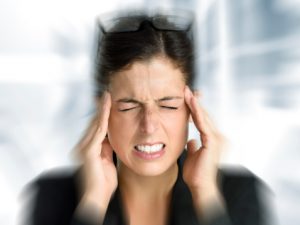
Migraines typically occur more in females, individuals between the ages of 35 and 55, low incomes groups and Caucasian people. Migraines can range in severity, and it’s reported that 91 percent of sufferers miss out on work or can’t function due to severe migraines.
Migraines are an inherited neurological disorder, occurring when hyper-excitable brain networks become triggered. Triggers for migraines may include fragrances, alcohol and light glare. Symptoms of migraine include throbbing or pulsating pain, sensitivity to light, sensitivity to sound, nausea, pain on one side, changes to vision, blurry vision, aura and vomiting.
The World Health Organization lists migraines as one of the top 20 disabling medical illnesses and, unfortunately, chronic migraines are even more disabling. Individuals with migraines are more likely to suffer from depression, anxiety, sleep disorders and fatigue. Furthermore, migraine suffers who experience auras are at higher risk of stroke and heart attack.
Less than one percent of the National Institutes of Health budget is allotted to research, thus much is unknown about migraines. More research is needed in the exploration of migraines to not only better understand their cause, but to be able to offer individuals more effective treatment, so they no longer have to experience such debilitating pain.
Cholesterol levels and migraine severity
The authors wrote, “This study shows a significant positive association between migraine frequency and intensity with total and LDL cholesterol, demonstrating for the first time a significant reduction of these lipid parameters after migraine prophylaxis. These results should be considered as preliminary, to be confirmed by future prospective controlled trials.”
Tips to avoid migraine triggers
Although there are many common triggers, each individual is different; it’s important to learn what your triggers are so you can avoid them. First let’s list off some common triggers so you can begin to narrow down your search.
- Menstrual periods
- Changes in sleep pattern
- Extreme fatigue
- Certain foods and beverages
- Too much caffeine or withdrawal
- Skipping meals or fasting
- Changes in weather
- Exercise
- Smoking
- Bright, flickering lights
- Odors
Now that you recognize some common triggers, here are some effective tips you can use to successfully avoid such triggers.
- Minimize caffeine intake, but be wary about cutting it out completely because that can cause withdrawal.
- Monitor your exercise.
- Reduce your stress.
- Get regular sleep.
- Stop smoking or cut down.
- Request friends and family avoid wearing strong scents, like perfumes or laundry detergents.
- Eat regularly.
Lower LDL cholesterol to reduce migraine severity
The research shows there is an association between total and LDL cholesterol, so it may also be a good idea to keep your cholesterol in healthy range. Not only will healthy cholesterol minimize your migraines, but it can improve your overall health as well. Below are the top five ways to improve your cholesterol.
- Eat heart healthy foods – choose healthy fats, eliminate trans fats and consume more soluble fiber.
- Exercise – although exercise may be a trigger, monitoring your exercising or working out at a lower-intensity level may still be safer.
- Quit smoking.
- Lose weight.
- Drink alcohol in moderation.
Other migraine headache pain relief tips
Migraines can be quite severe and debilitating, so finding effective pain relief options can help you overcome the migraine easier. Here are some tips you can try to help your migraine headaches.
- Promote a positive migraine-free environment – turn off the lights, apply cold/hot compresses and minimize noise.
- Sleep well – stick to a regular sleep schedule, relax at the end of the day, minimize distractions which may keep you awake and check your medications as they may be keeping you awake at night.
- Eat well – don’t skip meals, avoid food triggers and keep a food journal.
- Exercise regularly.
- Manage stress – manage you time, simplify your life, adjust your attitude and relax.
- Keep a migraine diary to help you notice patterns and uncover possible triggers.
Related Reading:
Blood pressure drug to treat migraines
Migraines are a painful problem that can interfere with everyday life, leaving many holed up inside with the curtains drawn when migraine strikes. Treatment drugs currently on the market may not be effective, but a recent discovery may help to provide relief from the pain and vision issues. Continue reading…
Do lower income individuals have more migraines and pain?
You may think that your income level has nothing to do with how you experience pain; however, recently published research in Neurology has shown that individuals who have lower incomes also have more pain from migraines. Continue reading…
Sources:
http://www.renalandurologynews.com/cardiovascular-disease-cvd/migraine-severity-linked-to-cholesterol-levels
http://migraine.com/migraine-statistics
http://www.americanmigrainefoundation.org/support-the-foundation/facts-about-migraine
http://www.webmd.com/migraines-headaches/avoiding-migraine-triggers
http://www.mayoclinic.org/diseases-conditions/high-blood-cholesterol/in-depth/reduce-cholesterol/art
http://www.mayoclinic.org/diseases-conditions/migraine-headache/in-depth/migraines